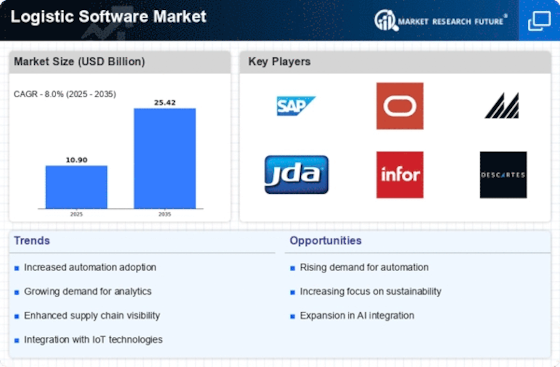Market Analysis
In-depth Analysis of Logistic Software Market Industry Landscape
The logistic software market is undergoing significant changes driven by dynamic market dynamics. As businesses are increasingly acknowledging the importance of efficient supply chain management, the demand for logistic software has surged. The market dynamics of this sector are shaped by a multitude of factors, with technological advancements playing a pivotal role. The integration of technologies such as AI, ML, and IoT has transformed traditional logistic processes. This shift has resulted in a growing emphasis on real-time tracking, predictive analytics, and automation, enhancing the overall efficiency of logistics operations. Moreover, the market dynamics are influenced by the global nature of trade and commerce.
As businesses run their programs to expand operations globally, the need for comprehensive logistic solutions has become paramount. Logistic software, with its ability to streamline international shipping, customs clearance, and cross-border logistics, has become a tool for businesses seeking a competitive edge in the global marketplace. This globalization trend has led to an increased demand for software solutions that can seamlessly manage complex supply chains and navigate diverse regulatory environments. Another key driver of market dynamics in the logistic software sector is the growing e-commerce industry. The rise of online shopping has created a surge in demand for fast, reliable, and cost-effective logistics solutions. Logistic software is essential for e-commerce companies to manage inventory, track shipments, and optimize delivery routes, ensuring a seamless customer experience. The rapid growth of the e-commerce sector has propelled the logistic software market forward, prompting software providers to innovate and adapt to the evolving needs of online retailers. Furthermore, the market dynamics are shaped by the need for sustainability and environmental responsibility.
As businesses increasingly focus on reducing their carbon footprint and adopting eco-friendly practices, logistic software plays a crucial role in optimizing transportation routes, minimizing fuel consumption, and reducing overall environmental impact. This shift towards sustainable logistics has led to the development of software solutions that prioritize energy efficiency and environmentally conscious supply chain practices. Competition among software providers also contributes to the evolving market dynamics. With numerous companies entering the logistic software market, there is a constant drive for innovation and differentiation. This competition fosters the development of feature-rich and user-friendly software solutions, giving businesses a wide range of options to choose from. The competitive landscape encourages providers to stay ahead of the curve, incorporating the latest technologies and functionalities into their offerings.
Additionally, the increasing awareness of cybersecurity threats has become a significant factor influencing the market dynamics of logistic software. As logistics involves the handling of sensitive data and critical information, the importance of robust cybersecurity measures cannot be overstated. Software providers are continuously enhancing the security features of their products to safeguard against cyber threats, thereby addressing the growing concerns of businesses regarding data protection and integrity.


















Leave a Comment